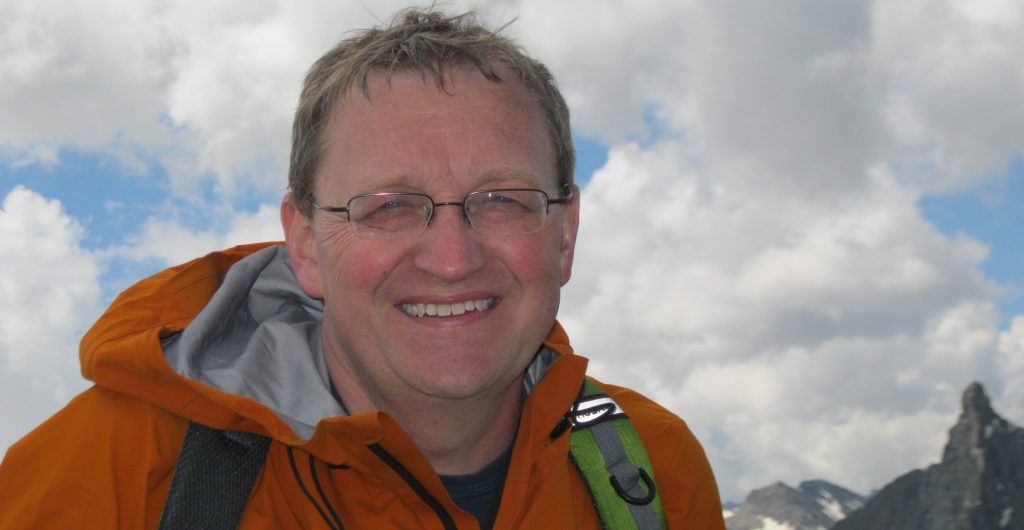 Luc Lavier, a research scientist at the University of Texas Institute for Geophysics (UTIG), has been awarded the Evgueni Burov Medal by the International Lithosphere Program (ILP) at a ceremony at the European Geophysical Union (EGU) in Vienna. According to the ILP, Lavier, who is also an Associate Professor at the University of Texas at Austin Jackson School of Geosciences, was awarded the medal “because of his strong scientific contributions in lithospheric dynamics through high-quality and innovative research in an open and collaborative spirit.”
Luc Lavier, a research scientist at the University of Texas Institute for Geophysics (UTIG), has been awarded the Evgueni Burov Medal by the International Lithosphere Program (ILP) at a ceremony at the European Geophysical Union (EGU) in Vienna. According to the ILP, Lavier, who is also an Associate Professor at the University of Texas at Austin Jackson School of Geosciences, was awarded the medal “because of his strong scientific contributions in lithospheric dynamics through high-quality and innovative research in an open and collaborative spirit.”
Lavier, who is the medal’s second recipient, said that he was delighted to receive the award. “I feel very happy to be recognized not just for my science but at the same time for being a positive influence on the community. I think this is important for the visibility of the university and for the international reputation of the Jackson School.”
Mrinal Sen, UTIG interim-Director, Professor and Jackson Chair in Applied Seismology said, “Luc is an exceptional geoscientist and a unique individual. Luc’s deserved recognition within the international scientific community further reinforces UTIG’s reputation as a world-leading geophysics research institute.”
Thorsten Becker, a senior research scientist who works at UTIG with Lavier said, “Luc’s work is much in the spirit of Evgueni, trying to bridge geology and geophysics while helping the community along.”
The International Lithospheric Program was established 40 years ago by the IUGS (International Union of Geological Sciences) and IUGG (International Union of Geodesy and Geophysics) to promote and advance fundamental lithosphere research with the aim of forming novel concepts concerning a process-oriented understanding of the Earth.
According to the ILP, the medal was established to promote high class science in combination with community services for mid-career achievements. The medal serves to honor and recognize individuals who are enthusiastic researchers, scientists, teachers and contributors to ILP and the wider science community. The medal itself is named after Evgueni Burov, a geophysicist renowned for his enthusiastic and collaborative approach who passed away suddenly in 2015.
Science is supposed to be altruistic”
Lavier believes that positive collaboration is an essential part of scientific progress. “Science is moving only if we have very collaborative ties,” he says. “When we work together we help build and strengthen the community and as a result the field goes up as a whole.” Positive collaboration in an environment where scientists encourage one another can also be a great way to trigger innovation. “If you are very collaborative and very positive, people are more willing to take some risk,” explains Lavier.
For Lavier, however, the most significant influence on his career has come from his students. “It is truly the success of all the students and postdocs I have supervised or co-supervised from whom I learned so much,” he says. “Paresh Patel, Ryan Lester, Dan Eakin, Liz Logan, Anna Svartman Dias, Rodriguo Lima, Guangliang Wu, Bud Davis, Nicole Hart, Kunpeng Liao, Xinyue (Dennis) Tong, James Biemiller, Gabriel Tagliaro, Simone Puel, Nicholas Montiel , Wolfgang Bangerth, Nathan Downey, Corey Trahan, Ravindra Duddu, Eh Tan, Eunseo Choi, Suzon Jammes, Jacqueline Reber and Andrew Smye.”
Lavier’s research group works to understand the fundamental laws controlling how the earth deforms and changes over time. “The applications for this are everywhere,” he said. “As soon as you have a fundamental understanding of how solid earth materials (such as rock or ice) flow, you can simulate any kind of process. The goal is to simulate processes lasting only seconds, such as earthquakes, to timescales of millions of years like building a mountain or forming an ocean.”
His group’s most recent work was led by Dennis Tong, a graduate research assistant at UTIG and Jackson School PhD student. “Dennis has been simulating earth deformation over different time scales from milliseconds to millions of years. He’s done a great job, the techniques he’s developed are amazing and can be used to simulate tectonic deformation from earthquakes to mountain building.”
Science without conscience is but the ruin of the soul” – François Rabelais
Lavier references an unusual inspiration when talking about science. “Science sans conscience n’est que ruine de l’âme: Science without conscience is but the ruin of the soul.” The quote is from Gargantua and Pantagruel, a collection of nonsensical, carnivalesque tales about two giants by the French Renaissance satirical writer François Rabelais. For Lavier, science is a fundamentally altruistic endeavor that must be driven by a diverse set of motivations, techniques, and people. “It is definitely a serious discipline addressing a lot of very serious sobering issues such as natural hazards, the effects of global warming and natural resources. However we need to stay lighthearted about it, otherwise we risk losing the very important creative streak of it all.”
